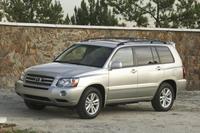Toyota, UC Irvine and Horiba Expand the Hydrogen Community
March 1, 2004 -- Torrance, CA -- California's "Hydrogen Community" grew a little bigger today when Toyota delivered another Fuel Cell Hybrid Vehicle (FCHV) to the National Fuel Cell Research Center at the University of California, Irvine. The fuel cell vehicle will be leased by Horiba Instruments, Inc., a worldwide manufacturer of analytical and engine measurement instruments and systems. This is Toyota's 18th FCHV on the road in the United States and Japan.
Horiba is the second Irvine-based company to adopt an advanced technology Toyota fuel cell vehicle as a daily driver. Employees of Orthodyne Electronics, a manufacturer of ultrasonic wire bonders, have been driving a Toyota fuel cell vehicle since 2002. Both companies will provide real-world data on the capabilities and functionality of fuel cell vehicles.
"We must challenge ourselves to develop a hydrogen vehicle that has the right packaging and pricing as soon as possible," said Jim Press, executive vice president and COO of Toyota Motor Sales, U.S.A., Inc. "The key is to work together in partnership with educators, businesses and government agencies to make the hydrogen economy a reality."
The Toyota FCHV is based on the popular Toyota Highlander, a five-passenger, mid-size sport utility vehicle, and utilizes the same hybrid technology perfected in the Toyota Prius. The fuel cell stack was developed and built in-house solely by Toyota.
The FCHV's fuel cell system features four 5,000-psi hydrogen fuel tanks. The hydrogen gas is fed into the fuel cell stack, where it is combined with oxygen.
The electricity produced by the chemical reaction is used to power the 109-hp electric motor and to charge the vehicle's nickel-metal hydride, which feeds power-on-demand to the electric motor. It has a range of up to 180 miles and a top speed of 96 miles per hour. The only by-product of the Toyota fuel cell vehicle is water vapor, and it has been certified as a zero emissions vehicle by the California Air Resources Board.
"We are excited to be joining Toyota and UC Irvine in the Hydrogen Community," said Atsushi (Art) Horiba, president of Horiba, Ltd. "This is consistent with our company's commitment to providing solutions to environmental problems."
Toyota has enlisted the University of California, Irvine and the University of California, Davis to test different aspects of consumer acceptance and market dynamics of fuel cell vehicles. Each campus leases two Toyota FCHVs. The National Fuel Cell Research Center at UC Irvine researches product performance, reliability and usability. The Institute of Transportation Studies at UC Davis uses its fuel cell Toyotas to study consumer awareness of and attitudes toward hydrogen fuel cell vehicles and the use of hydrogen fueling infrastructure.
"The evaluation of the public use of, and public reaction to, a hydrogen-fueled fuel cell vehicle is critical to understanding and establishing the roadmap to the hydrogen economy," said Scott Samuelsen, director of the National Fuel Cell Research Center. "Only through careful planning and preparation will the hydrogen economy evolve and achieve the energy efficiency and environmental goals demanded by the world market."



